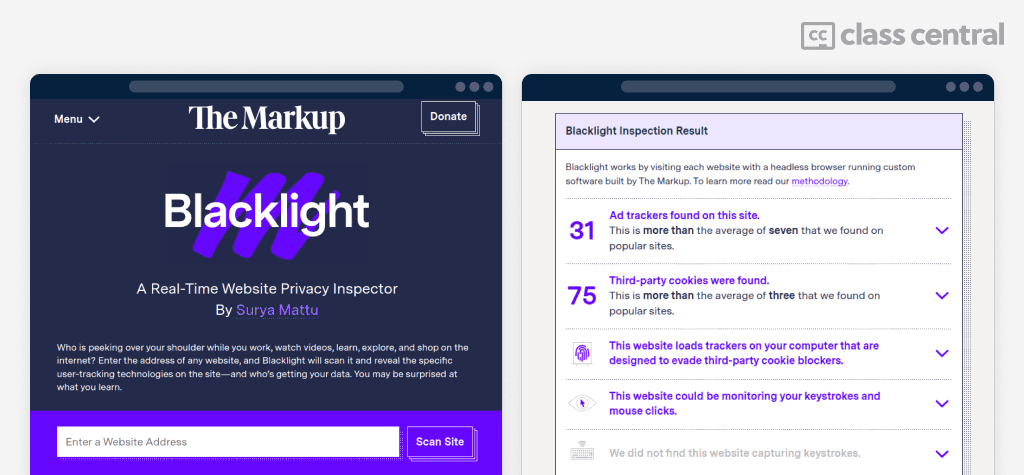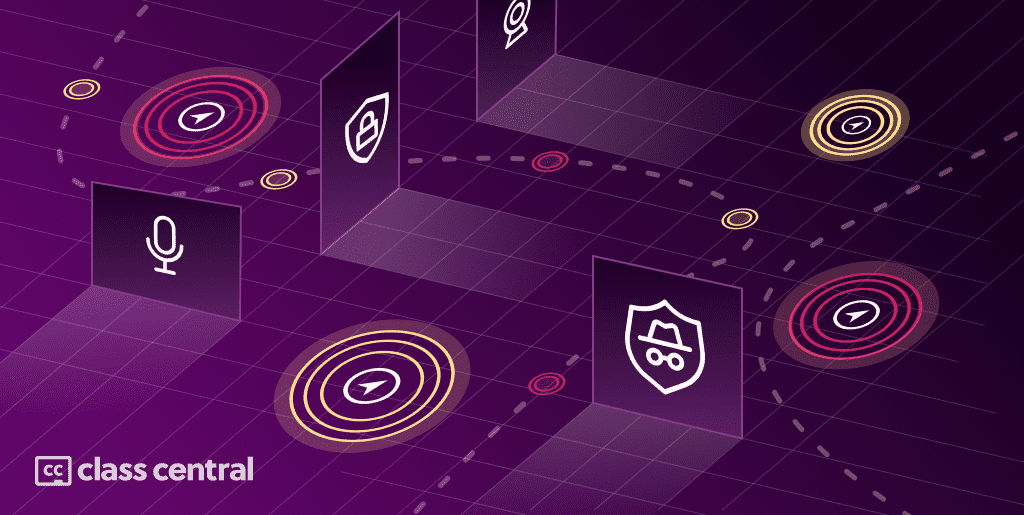How Online Course Platforms Track Learners in 2022
Online course platforms closely track their learners. And things have gotten worse over the past two years.
If there’s something we’ve learned in the ten years we’ve been running Class Central, it’s how important digital marketing is in the strategy of online education platforms. Some of the largest ones spend millions every month on Google Ads.
These platforms tend to rely on third-party tools to learn more about their users and even target them through ad campaigns. But some of these tools can raise privacy concerns and allow big tech companies to follow you around the web.
So we decided put to the test popular online course platforms using Blacklight, the open-source privacy tool developed by Surya Mattu over at The Markup. We did it first in 2020, and we’re doing it again now, to see how things have changed.
Combined, these platforms receive 470M1 visits monthly, and they’ve raised billions of dollars in funding. Let’s see to what extent they track their learners.
Methodology

We decided to focus on online course platforms that mainly target adult learners. We tried to pick a comprehensive, albeit non-exhaustive, sample of platforms spanning different categories — for instance:
- Online course & MOOC platforms, such as Coursera, edX, and FutureLearn.
- Tech e-learning platforms, such as Udemy, and Pluralsight, and Udacity.
- Online degree platforms, such as WGU, SNHU, and Stanford Online.
- Professional education, such as eCornell, HBS Online, and GetSmarter
- Online bootcamps, such as Bloom Tech, Thinkful, and General Assembly.
We selected 66 online course platforms in total, and we ran each one through Blacklight. You can learn more about how the privacy tool works here. It allowed us to compile the following seven features for each platform:
- Ad Trackers: These are technologies used for collecting user information and targeting users with ads. For example, if you open an email promoting a particular product, the company might send you a follow-up email with a coupon to encourage you to buy it.
- Third-Party Cookies: These are small pieces of text stored on your computer by another domain than the one you’re visiting. For example, when you visit website A, website B might set a cookie. If you ever visit website B, they’ll read the cookie and recognize you.
- Canvas Fingerprinting: This method leverages the fact that computers with different hardware might render visuals differently. For example, if two visitors render an image similarly, the website may deduce that the two visits came from the same computer.
- Session Recording: This is when a website monitors all your actions, such as mouse position and clicks. It often also includes key logging. For instance, by monitoring mouse movements, a website can build a heatmap of how you interact with their web page.
- Key Logging: This is when a website monitors what you’re typing as you do it. For instance, if you’re asked for your phone number and you start typing it but then decide not to submit it, the website could still record it because they monitored your keystrokes.
- Facebook Pixel: This is a piece of code from Facebook that allows to track you as you go from a website to Facebook. For example, if you check a product on a webshop that uses Facebook Pixel and later visit Facebook, you may be shown an ad for that product.
- Google Remarketing Audiences: This is a Google Analytics feature that allows to serve custom ads across the Google Network. For instance, if you search a product on a website that uses the feature and then visit YouTube, you may be shown related ads.
Without further ado, here are the results.
Summary Results
In total, we put 66 online course platforms to the test. Here are some summary statistics about them:
The 66 providers tested:
- Receive over 470M1 visits per month between them.
- Include 9.4 ad trackers on average.
- Store 17.5 third-party cookies on average.
Of the 66 providers tested:
- 73% let Google track you.
- 71% let Facebook track you.
- 33% record your mouse and keystrokes.
Finally, between 2020 and 2022, the number of:
- Ad trackers increased on average by 43%.
- Third-party cookies increased on average by 166%.
Results: Ad Trackers
Here are the ten platforms with the highest number of ad trackers. Note the significant increase between 2020 and 2022.
| Platform | Ad Trackers (2020) | Ad Trackers (2022) | Increase |
| Coursera | 19 | 31 | 63% |
| Pluralsight | 18 | 29 | 61% |
| Udacity | 17 | 25 | 47% |
| Western Governors University (WGU) | 24 | 24 | 0% |
| Upgrad | 9 | 23 | 156% |
| Harvard Business School Online | 22 | 23 | 5% |
| Springboard | 23 | 23 | 0% |
| MasterClass | 9 | 21 | 133% |
| Emeritus | 13 | 21 | 62% |
| The Great Courses | 15 | 21 | 40% |
| Mean | 16.9 | 24.1 | 43% |
Results: Third-Party Cookies
Here are the ten platforms with the highest number of third-party cookies. The increase between 2020 and 2022 is even more significant. And unsurprisingly, many platforms in this table were also in the previous one.
| Platform | Cookies (2020) | Cookies (2022) | Increase |
| Coursera | 30 | 75 | 150% |
| Emeritus | 5 | 69 | 1280% |
| Udacity | 16 | 62 | 288% |
| Pluralsight | 6 | 58 | 867% |
| MasterClass | 6 | 49 | 717% |
| Western Governors University (WGU) | 42 | 47 | 12% |
| The Great Courses | 11 | 45 | 309% |
| Harvard Business School Online | 39 | 44 | 13% |
| ASU Online | 15 | 44 | 193% |
| Springboard | 30 | 39 | 30% |
| Mean | 20 | 53.2 | 166% |
Results: By Traffic
Finally, here are the number of ad trackers and third-party cookies detected on the ten platforms with highest monthly traffic1.
| Platform | Monthly Traffic | Ad Trackers | Third-Party Cookies |
| Udemy | 97.3M | 19 | 23 |
| Duolingo | 77.0M | 9 | 14 |
| Coursera | 47.3M | 31 | 75 |
| Khan Academy | 46.7M | 1 | 0 |
| Unacademy | 21.5M | 5 | 3 |
| freeCodeCamp | 19.9M | 2 | 1 |
| edX | 12.4M | 13 | 17 |
| Platzi | 9.9M | 10 | 22 |
| MasterClass | 9.7M | 21 | 49 |
| Domestika | 9.7M | 9 | 25 |
| Mean | 35.1M | 12 | 22.9 |
Note that the mere presence of a tracker or cookie isn’t necessarily a red flag. There are legitimate reasons for their use. It’s when used in excess, or when they pipe user data through big tech companies, that they raise privacy concerns.
For instance, you can see in the table above that the nonprofits Khan Academy and freeCodeCamp use hardly any trackers, demonstrating that high traffic need not always be achieved at the cost of user privacy.
If you’re wondering, here’s how Class Central fares when run through Blacklight.
Raw Data
If you’d like to explore the numbers yourself, you can find the full raw data here.
References
- The traffic data were collected on June 4, 2022, using SimilarWeb. They cover the month of April 2022.
- The 2020 data were collected on June 28, 2020. The 2022 data were collected on June 4, 2022. We noticed that over several runs, the tool could output different results, but these were always in the same ballpark. As providers continue to tweak their platforms, you might see different numbers.
Disclaimer: Class Central has or has had affiliate or advertising relationships with some of the platforms in this analysis.

Dhawal Shah








Ronny De Winter
Lightbeam extension on FireFox allows you to visualise the tracking in a graph